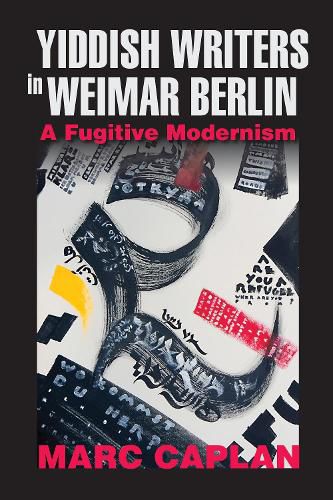Readings Newsletter
Become a Readings Member to make your shopping experience even easier.
Sign in or sign up for free!
You’re not far away from qualifying for FREE standard shipping within Australia
You’ve qualified for FREE standard shipping within Australia
The cart is loading…






In Yiddish Writers in Weimar Berlin, Marc Caplan explores the reciprocal encounter between Eastern European Jews and German culture in the days following World War I. By concentrating primarily on a small group of avant-garde Yiddish writers-Dovid Bergelson, Der Nister, and Moyshe Kulbak-working in Berlin during the Weimar Republic, Caplan examines how these writers became central to modernist aesthetics. By concentrating on the character of Yiddish literature produced in Weimar Germany, Caplan offers a new method of seeing how artistic creation is constructed and a new understanding of the political resonances that result from it.
Yiddish Writers in Weimar Berlin reveals how Yiddish literature participated in the culture of Weimar-era modernism, how active Yiddish writers were in the literary scene, and how German-speaking Jews read descriptions of Yiddish-speaking Jews to uncover the emotional complexity of what they managed to create even in the midst of their confusion and ambivalence in Germany.
Caplan’s masterful narrative affords new insights into literary form, Jewish culture, and the philosophical and psychological motivations for aesthetic modernism.
$9.00 standard shipping within Australia
FREE standard shipping within Australia for orders over $100.00
Express & International shipping calculated at checkout
In Yiddish Writers in Weimar Berlin, Marc Caplan explores the reciprocal encounter between Eastern European Jews and German culture in the days following World War I. By concentrating primarily on a small group of avant-garde Yiddish writers-Dovid Bergelson, Der Nister, and Moyshe Kulbak-working in Berlin during the Weimar Republic, Caplan examines how these writers became central to modernist aesthetics. By concentrating on the character of Yiddish literature produced in Weimar Germany, Caplan offers a new method of seeing how artistic creation is constructed and a new understanding of the political resonances that result from it.
Yiddish Writers in Weimar Berlin reveals how Yiddish literature participated in the culture of Weimar-era modernism, how active Yiddish writers were in the literary scene, and how German-speaking Jews read descriptions of Yiddish-speaking Jews to uncover the emotional complexity of what they managed to create even in the midst of their confusion and ambivalence in Germany.
Caplan’s masterful narrative affords new insights into literary form, Jewish culture, and the philosophical and psychological motivations for aesthetic modernism.